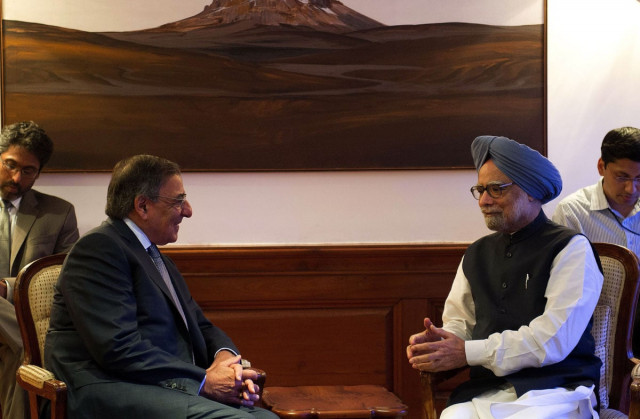India - US defence talks to focus on China, Afghanistan
Panetta's India visit states Washington's strategic shift to Asia, stressing India as an anchor for the new...

Panetta's two-day visit to New Delhi is part of a tour of the region that has stressed Washington's strategic shift to Asia, with US officials portraying India as an anchor for the new approach.
In talks Tuesday with Prime Minister Manmohan Singh, Panetta "underscored the link India plays between East and West Asia and how the United States views India as a net provider of security from the Indian Ocean to Afghanistan and beyond," his press secretary George Little said.
Panetta will meet Defence Minister AK Antony on Wednesday before giving a policy speech at the Institute for Defence Studies and Analyses.
In his talks with Antony, Panetta was expected to discuss NATO's planned withdrawal of combat forces from Afghanistan by the end of 2014 as well an expanding arms trade and joint military training between the two countries.
Indian officials are worried the departure of most of the US-led force could leave a dangerous vacuum in Afghanistan, and question if the Kabul government and its fledgling army will be able to fend off Taliban insurgents.
US officials said Panetta was encouraging India to play a more active role in Afghanistan.
Earlier on his nine-day tour through Asia, Panetta unveiled plans to shift the majority of the US naval fleet to the Pacific by 2020, a symbolic step meant to signal US determination to preserve its influence in the face of a rising China.
Beijing said Monday the US naval plan was "untimely" and called on Washington to respect its interests in the region.
The tilt towards Asia is designed mainly as a way to check China's role, particularly in the contested South China Sea, reinforcing US diplomacy in support of smaller nations locked in territorial disputes with Beijing.
The US administration views India as a counterweight to China, though in public statements senior officials insist the new strategy is not meant as a challenge to Beijing.
Panetta's visit follows India's successful test launch in April of a new missile capable of delivering a one-tonne nuclear warhead anywhere in China, marking a major advance in its military capabilities.
India views the rocket, which has a range of 5,000 kilometres (3,100 miles), as a boost to its regional power aspirations and one that narrows - albeit slightly - the huge gap with China's missile systems.
India is investing in military hardware to modernise its armed forces, and the United States has become one of its major arms suppliers, with $8.5 billion in sales over the past 11 years, according to the Pentagon.
Panetta's trip coincides with two weapons deals that are close to being wrapped up.
India has agreed to buy 145 howitzer guns from the US unit of British arms group BAE Systems in a deal worth $560 million. And India is close to clinching a $1.4 billion agreement to purchase 22 Apache attack helicopters manufactured by Boeing, US officials said.



















COMMENTS
Comments are moderated and generally will be posted if they are on-topic and not abusive.
For more information, please see our Comments FAQ